Diverse Themes
The refugee / migrant crisis is a huge and complex subject not least in the tension between these two terms.
One psychological issue arises from the disputed questions as to what part climate change plays in droughts and what part droughts play in migration. John Kerry, Jean-Claude Juncker and FOE’s Craig Bennett led the chorus of voices last month urging us all to treat the current crisis as a warning about climate change. See also this cartoon. It is hard for any of us who are promoting engagement not to resonate with this message, but it contrasts with the findings of the UK Climate Change and Migration Coalition, whose careful research suggests that the majority of climate refugees move relatively short distances and that it is hard to prove or quantify the climate factor in Syria’s political and military turmoil. Are those of us who understand the importance of powerful stories in mobilising human responses, and who long to overcome the “distance problem” with climate change, in danger of being thwarted by the facts at this juncture?
Climate change has featured large in a politically lively month. Australia has ousted its climate-denying, backward-looking premier, as discussed in The Conversation. In the USA, Republican paroxysms over the Pope’s message range from the old threadbare argument that he’s not a scientist to the florid accusation that he’s in league with the devil. In the UK, excitement at the political mould being broken by Jeremy Corbyn’s election to lead the Labour party is tempered by the view, that his espousal of Green perspectives, whilst greatly superior to the current government’s record, lacks depth.
Shell’s abandonment of Arctic drilling for the foreseeable future looks like a decisive triumph for environmental activism. The New York Times article emphasises the conflicting interests and realities that are an on-going theme of this newsletter. Fossil fuels are characterised by some as the bloodstream of modern human economic systems, but are also the toxin which threatens to bring systemic collapse.
Volkswagon’s image as a leader in environmentally aware motoring has evaporated in a matter of days. Beneath all the talk of corporate greed, executive power and shareholder disenfranchisement, cut-throat competition in the motor industry and pollution standards, is this another psycho-social story of how we deal with the collision of economics and ecology and the associated values? The collision, if allowed as experience, is not just inconvenient but intensely demanding and uncomfortable. Cheating, in one way or another, not only helps to preserve a competitive edge for the perpetrator in a commercial context, but also extends a fool’s paradise of comfort to all participants. We can motor all we like and feel virtuous into the bargain. This could lead into a later discussion of the manipulation and abuse of numbers in the policy field. See Politico’s article “The Green Car Myth?.
Cherry-picking of metrics is a thorny issue in the lead-in to Paris 2015. Some readers of this newsletter will recall Rosemary Randall’s ground breaking article in “Engaging with Climate Change” (Ed. Sally Weintrobe): Great Expectations and the psychodynamics of ecological debt. An article in New Scientist, outlines how Damon Matthews of Concordia University, Montreal set out to define the ecological debt per capita in various countries. All such metrics are inevitably crude and open to question, but this article advances the point that there is a high correlation between wealth and ecological debt.
To conclude – a final reminder of CPA’s event “When the Heart Can’t Contain What the Mind Can See” at Birkbeck College, London on Saturday 24th October. This is a collaboration with the Association for Psycho-Social Studies and Birkbeck Institute for Social Research. Details and booking link. This event will be followed by a Special General Meeting of CPA.
Adrian Tait
(On behalf of the Exec. Committee)


